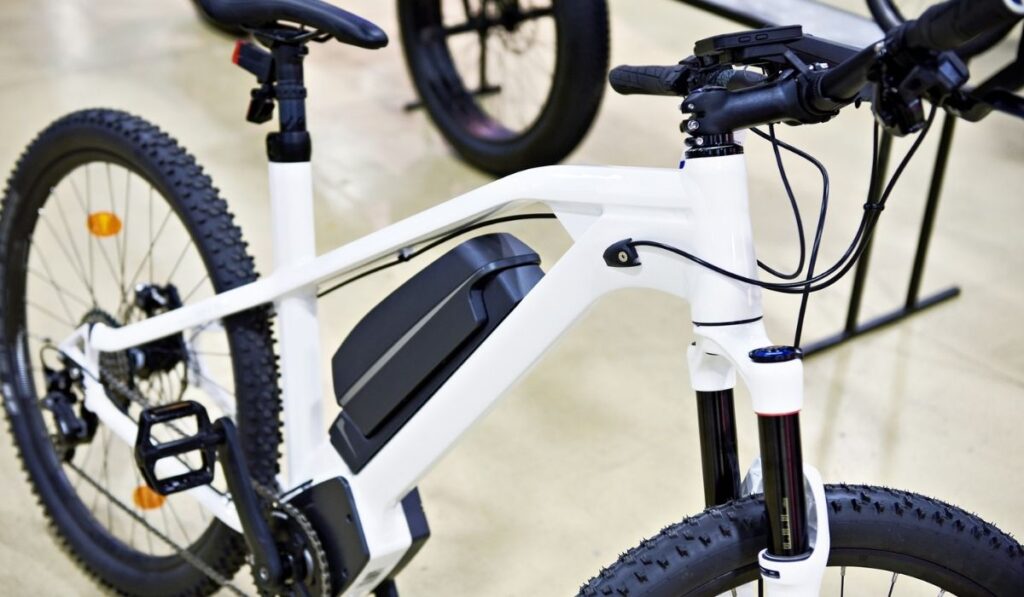We all want to reduce our carbon emissions. While biking is a great way to accomplish that, but sometimes you just want something a little more power. E-bikes are here to offer the best of both worlds; reduced carbon emissions and a convenient, easy, sweat-free way to get to work or school.
E-bikes are much more eco-friendly than cars. Not only do they produce less pollution, but they are “green” by requiring far less energy to move around than a two-thousand-pound car. E-bikes do produce some battery waste, but there are ways to recycle batteries properly and the overall impact, relative to cars, is low.
If you are considering an e-bike, you probably have a lot of questions. One that often comes up is how eco-friendly they even are. While they may not be totally innocent when it comes to carbon emissions, e-bikes certainly are greener when compared to other popular forms of transport. Ready to learn more about e-bikes and how they compare to cars? Read on!
Are E-Bikes Really Eco Friendly?

Alright, so let’s get into the facts. Are e-bikes actually as eco-friendly as they seem? This, unfortunately, is a complicated question that has an equally complicated answer. Considering how eco-friendly an e-bike is, it comes with quite a few things to consider.
Generally speaking, e-bikes are eco-friendly. Not only do they reduce your reliance on carbon-based forms of transportation, but they can also benefit you in other ways such as encouraging healthy lifestyle changes.
When we say it’s a loaded question, it’s because there are thousands of variables you could bring up that complicate the situation. But when we compare e-bikes to other common forms of transportation, like cars, e-bikes take the front spot hands down.
It’s really a no-brainer. A car uses fossil fuels and pumps CO2 into the atmosphere — which, if you don’t know, is the primary greenhouse gas causing man-made damage to our environment.
But when we get down to the nitty-gritty details, it gets more complicated still. Consider transaction costs, or the costs of manufacturing, sourcing materials, and transportation. We live in a globalized world, and the reality is that even an e-bike has a dark side when it comes to how it’s made.
It’s not just the factory putting it together; it’s the mining for lithium used in batteries or the smelting of the steel needed for the drivetrain. Not to mention all the gas and oil that transportation methods used carrying all the parts across the country to put the machine together. As you can imagine, we could go all day with this.
While these considerations should be on your mind when making any eco-friendly purchase, but at the end of the day you can only do your best. So are you going to find an e-bike that has no carbon footprint? Well, no. But can you choose to use a more reliable form of transportation that will help reduce your daily reliance on fossil fuels overall? You bet.
But are Electric Bikes Better Than Cars (For The Environment)?
This is where the conversation starts to heat up. You see, while the manufacturing process of an e-bike can throw some mud on the eco-friendly claims, there is no denying how they compare to cars when it comes to carbon emissions and general eco-friendliness.
E-bikes are much better for the environment than cars. But you’ll need to make sure you are practicing certain e-bike habits to get the most out of the eco-friendliness, like charging during off-peak hours and taking care of the battery.
First off, let’s take a look at the impact of cars on our motorways. You might not know this, but 30% of all carbon dioxide, 80% of carbon monoxide, and 50% of all nitrogen emissions come from motor vehicles chugging down roads all over the world.
All that carbon, and nitrogen, in the atmosphere, trap the sun’s heat, leading to what is known as the greenhouse effect. For those looking to do their part in saving the planet, cars are bad news. But of course, everyone knows that.
On average, a car will produce around 500 grams of carbon per mile. Electric cars will be more green, pushing out a slightly more reasonable 150 grams of carbon per mile as they quietly scoot down the road. But an e-bike? They come in at an astonishing 5 grams per mile. You don’t have to be a math wiz to do the calculations on this one.
A lot of that car-related carbon comes from the sheer amount of energy needed to move that kind of weight. Cars are not light, and while plenty of manufacturers have come up with ingenious ways to reduce overall weight, it still consumes the bulk of the energy needed to power your car.
If you add it all up, your car will produce 4.6 metric tons of carbon dioxide per year. Opting for using an e-bike however will drastically reduce that number.
What Waste Do Electric Bikes Produce?

As we touched on earlier, e-bikes are not without their own demons when it comes to waste and carbon. Generally speaking, though, they can drastically reduce the amount of carbon you produce during your daily excursions to work, the store, or anywhere.
When it comes to e-bike waste, things like the battery, energy source, and other costs all add to the waste produced by the product. Consider these factors when assessing the sustainability of e-bikes. In most cases, you’ll find that e-bikes are a much better option than cars, but still have some drawbacks when it comes to completely eco-friendly transportation.
It’s also worth noting the waste in the supply chain from the manufacturer’s perspective. We already talked about this in the form of transaction costs. These can be quite significant, but plenty of brands are taking steps towards offering more transparency in this regard. But while that is great, you should always still do your own research and find the right manufacturer that offers the most in terms of eco-friendly promises.
Another thing to consider when it comes to waste is power usage. While these are electric motors, that electricity has to come from somewhere. If the power you are relying on comes from coal, then it’s not very carbon neutral, is it? If you can, try and find renewable sources of electricity like solar to power your e-bike for the maximum sustainability benefits.
Can E-Bike Batteries be Recycled?

E-bike batteries are usually made using lithium-ion. This is by and large the most popular battery type, and not just for e-bikes. Not only are they rechargeable, but they can be recycled as well. But keep in mind; you’ll need to find an appropriate recycling center to guarantee proper disposal.
While the recycling process isn’t pretty and creates its own problems, it helps reduce reliance on newly mined lithium in a lot of cases. We could dive into what mining does for the environment, but you probably have a good idea of how bad it is already. Suffice to say, recycling is a much better alternative.
Additionally, lithium is a finite resource. As our reliance on the material grows, so does the need for deeper mines to keep up with demand. This can cause undue stress to the earth and be harmful to the workers who mine it. Recycling helps reduce dependency on mined lithium and is a great way to re-filter your old battery back into use.
What’s the Carbon Footprint of an Electric Bike?
So, we’ve already discovered how much better e-bikes are than cars. But what about their carbon footprint? Again, this isn’t the easiest thing to determine. There are a lot of factors that come into play that all add to the equation. Considering e-bike usage, it produces around 5 grams of carbon per mile. Now let’s look at the overall costs.
As we looked at earlier, carbon emissions come from more than just bike usage. They come from every stage of the process of e-bike manufacturing. That means all the carbon used in the mines, the factories, and the assembly plants. Add on the costs of transporting all those goods at every stage of the process and you’re looking at a hefty carbon bill.
Unfortunately, this is the reality of buying almost any product. Somewhere down the line, even though you might not see it, there is damage to the environment. If this is something that is bothering you, consider buying second-hand. Also, remember that while you might not be saving the world with your e-bike, you are doing a lot to reduce your own carbon footprint compared to car drivers.
Wrapping Up
E-bikes can greatly reduce your reliance on forms of transportation that emit carbon. Looking at you, cars. Generally, an e-bike will have a drastically reduced carbon footprint in comparison to cars, but they aren’t perfect. Things like where your electricity comes from, how you charge your bike, and transaction costs inherent in manufacturers all play a role in determining the “greenness” of an e-bike.
But don’t start turning away from an e-bike. In fact, e-bikes are a great way to add some extra juice to your daily ride and emit less carbon dioxide and other nasty greenhouse gases. You can’t go wrong with trying to do better for the environment, and in this way, e-bikes are a great method to become more eco-friendly.
